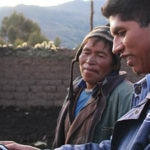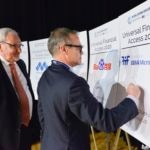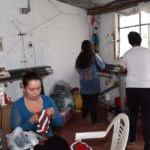Four years to give two billion people access to financial services
Everyone should have access to basic financial services by 2020. This goal, set by the World Bank, aims to combat the financial exclusion that impacts two billion people. Several organizations from the public and private sector, including BBVA Microfinance Foundation, have signed the Universal Financial Access 2020 (UFA), committing to meet this deadline.
Having a bank account is the first step to access basic financial services, such as loans or insurance, which help underprivileged families to receive essential services like water, electricity, housing, education or healthcare. It also allows small and medium sized businesses to grow, expand operations and improve risk management.

“We set a hugely ambitious goal -universal access to financial services by 2020 – and now we have evidence that we’re making major progress,” reported World Bank President Jim Yong Kim last year when major financial actors like Visa and MasterCard committed to the Universal Financial Access 2020.
But in most cases, the services banks provide do not meet the needs of people with low incomes. In fact, 59% of those without a bank account say the main reason they have not opened an account is because they do not have enough money. Frequently, the distance to banks, roads in poor conditions or lack of public transportation also make it very difficult to reach a financial provider.
“We set a hugely ambitious goal -universal access to financial services by 2020 – and now we have evidence that we’re making major progress
Overcoming these obstacles will require “many partners - credit card companies, banks, microcredit institutions, the United Nations, foundations and community leaders,” stressed Yong Kim. That’s why 15 organizations, including the BBVA Microfinance Foundation, just joined the World Bank initiative.
“The Foundation’s mission coincides with the World Bank’s strategic goal of reducing poverty,” said Alejandro Lorca, Finance Director of the BBVA Microfinance Foundation. This non-profit organization supports the development of vulnerable sectors in Latin America through financial inclusion. It provides a wide range of financial services and training for entrepreneurs with limited means in their homes and small businesses.

Alejandro Lorca, Finance Director of the BBVA Microfinance Foundation, with Philippe Le Houérou, IFC Executive Vice President and CEO, during the UFA 2020 signing
Latin America, a priority for the BBVA Microfinance Foundation
The UFA 2020 identified 25 priority countries where 73% of world’s financially excluded adults live. This includes Colombia, with a 61% financial exclusion rate, and Peru with 71%. The BBVA Microfinance Foundation works in both countries through the Bancamía and Financiera Confianza institutions, which have more than 1.2 million customers (two-thirds of the people supported by the Foundation in the Americas).
“Access to financial services is the key to reducing poverty. We therefore support the World Bank Group’s goal with our commitment to offer more than 2.3 million accounts by the end of 2020,” affirmed Javier M. Flores, Director General of the BBVA Microfinance Foundation.

Women, the most vulnerable
According to Global Findex’s latest report, only 58% of women had a bank account in 2014, compared to 65% of men. In the words of Sri Mulyani Indrawati, Managing Director and Chief Operations Officer at the World Bank, “Equipped with access to formal savings and credit, women participate more in the economy. They can set aside funds for emergencies, for schooling, or for starting a business. This is an important stepping stone out of poverty and towards more equality.” The BBVA Microfinance Foundation supports more than one million vulnerable women in Latin America.